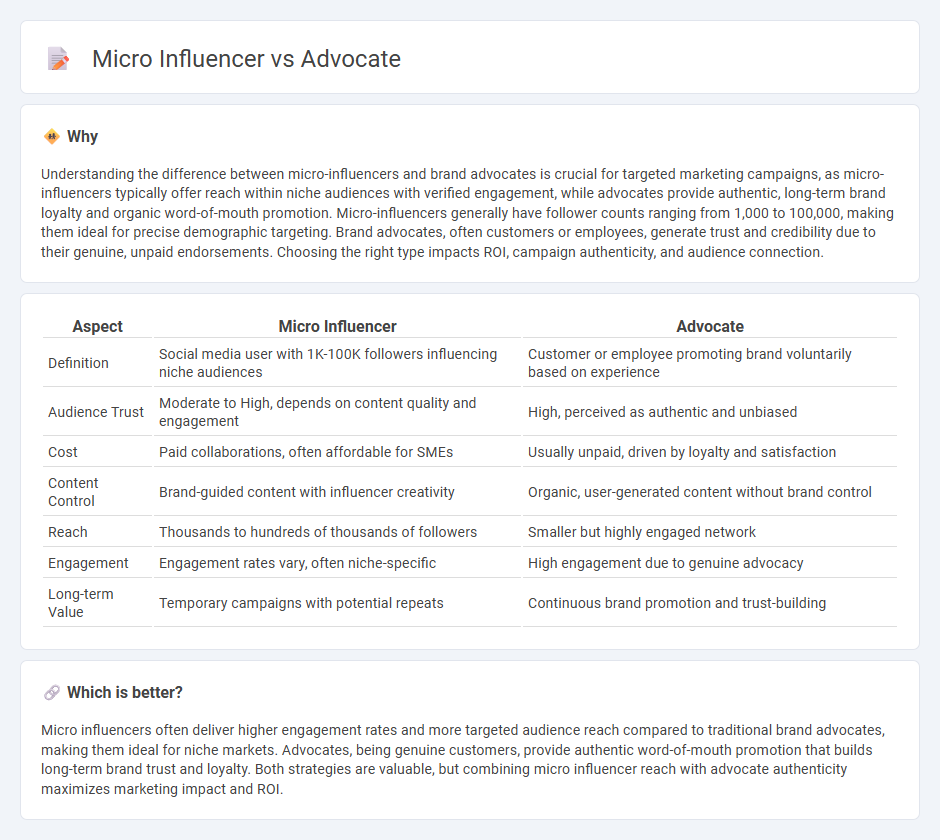
Micro-influencers typically have between 1,000 to 100,000 highly engaged followers and specialize in niche markets, making their endorsements feel more authentic and targeted. Brand advocates, on the other hand, are loyal customers or employees who naturally promote a brand out of genuine enthusiasm rather than financial incentive. Explore the unique benefits and strategies of micro-influencers versus brand advocates to enhance your marketing efforts.
Why it is important
Understanding the difference between micro-influencers and brand advocates is crucial for targeted marketing campaigns, as micro-influencers typically offer reach within niche audiences with verified engagement, while advocates provide authentic, long-term brand loyalty and organic word-of-mouth promotion. Micro-influencers generally have follower counts ranging from 1,000 to 100,000, making them ideal for precise demographic targeting. Brand advocates, often customers or employees, generate trust and credibility due to their genuine, unpaid endorsements. Choosing the right type impacts ROI, campaign authenticity, and audience connection.
Comparison Table
| Aspect | Micro Influencer | Advocate |
|---|---|---|
| Definition | Social media user with 1K-100K followers influencing niche audiences | Customer or employee promoting brand voluntarily based on experience |
| Audience Trust | Moderate to High, depends on content quality and engagement | High, perceived as authentic and unbiased |
| Cost | Paid collaborations, often affordable for SMEs | Usually unpaid, driven by loyalty and satisfaction |
| Content Control | Brand-guided content with influencer creativity | Organic, user-generated content without brand control |
| Reach | Thousands to hundreds of thousands of followers | Smaller but highly engaged network |
| Engagement | Engagement rates vary, often niche-specific | High engagement due to genuine advocacy |
| Long-term Value | Temporary campaigns with potential repeats | Continuous brand promotion and trust-building |
Which is better?
Micro influencers often deliver higher engagement rates and more targeted audience reach compared to traditional brand advocates, making them ideal for niche markets. Advocates, being genuine customers, provide authentic word-of-mouth promotion that builds long-term brand trust and loyalty. Both strategies are valuable, but combining micro influencer reach with advocate authenticity maximizes marketing impact and ROI.
Connection
Micro influencers and brand advocates both play crucial roles in marketing by generating authentic engagement and driving consumer trust through personal connections. Micro influencers, typically with 1,000 to 100,000 followers, create targeted content that resonates deeply with niche audiences, while brand advocates actively promote products based on genuine positive experiences. Their combined efforts amplify brand visibility and credibility, leading to higher conversion rates and improved customer loyalty.
Key Terms
Authenticity
Advocates build trust through genuine, long-term relationships by sharing personal experiences, while micro influencers leverage niche audiences with credible, relatable content that feels naturally integrated. Both emphasize authenticity, but advocates often have deeper emotional connections, whereas micro influencers balance authenticity with strategic content creation. Explore how choosing between advocates and micro influencers can elevate your brand's authenticity and engagement.
Reach
Advocates typically generate reach through authentic, word-of-mouth promotion within their existing networks, often resulting in higher trust and engagement. Micro influencers deliver reach by leveraging their niche audience across social media platforms, offering targeted visibility with measurable metrics. Explore how both advocate and micro influencer strategies can maximize your brand's outreach effectively.
Engagement
Advocates generate authentic engagement through genuine recommendations to their trusted networks, often leading to higher conversion rates and brand loyalty. Micro influencers, with their niche audiences, deliver targeted engagement by creating relatable and specialized content that resonates with specific demographics. Explore detailed strategies to maximize engagement effectiveness for both advocates and micro influencers.
Source and External Links
advocate | Wex | US Law | LII / Legal Information Institute - An advocate as a noun is an individual who actively supports or promotes the interests of another, and as a verb means to promote the interests of a person or group, commonly used for attorneys representing clients.
ADVOCATE | definition in the Cambridge English Dictionary - To advocate means to publicly support or suggest an idea or cause, and as a noun, an advocate is someone who speaks for or supports people needing extra help or protection.
Advocacy - California Lawyers Association - Advocacy in the legal profession involves promoting excellence, diversity, and fairness, with lawyers and organizations actively advocating for justice and inclusion.
 dowidth.com
dowidth.com